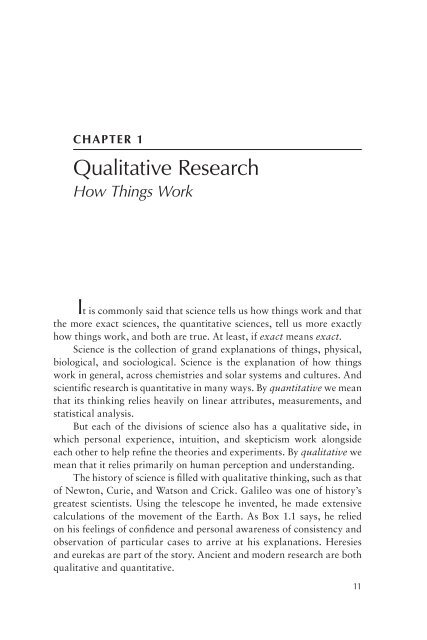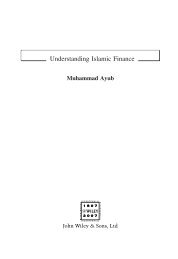- Page 2: Qualitative ReseaRch
- Page 5 and 6: © 2010 The Guilford Press A Divisi
- Page 7 and 8: vi acknowledgments To kith and kin,
- Page 9 and 10: viii Contents 3. experiential under
- Page 14 and 15: Introduction Make Yourself Comforta
- Page 16 and 17: Introduction 3 aware that quite a f
- Page 18 and 19: Introduction 5 Halldor Laxness: Und
- Page 20 and 21: taBle i.1. summary of the National
- Page 22: Introduction 9 trate an issue or as
- Page 27 and 28: 14 QUaLItatIVe ReSeaRCH Clinical kn
- Page 29 and 30: 16 QUaLItatIVe ReSeaRCH BOX 1.2. (c
- Page 31 and 32: 18 QUaLItatIVe ReSeaRCH temological
- Page 33 and 34: 20 QUaLItatIVe ReSeaRCH role and (2
- Page 35 and 36: 22 QUaLItatIVe ReSeaRCH for? It is
- Page 37 and 38: 24 QUaLItatIVe ReSeaRCH stayed out
- Page 39 and 40: 26 QUaLItatIVe ReSeaRCH community.
- Page 41 and 42: 28 QUaLItatIVe ReSeaRCH parisons. Y
- Page 43 and 44: 30 QUaLItatIVe ReSeaRCH for many ye
- Page 45 and 46: 32 QUaLItatIVe ReSeaRCH tative rese
- Page 47 and 48: 34 QUaLItatIVe ReSeaRCH BOX 1.3. (c
- Page 49 and 50: 36 chaPteR 2 Interpretation The Per
- Page 51 and 52: 38 QUaLItatIVe ReSeaRCH So that is
- Page 53 and 54: 40 QUaLItatIVe ReSeaRCH but of a ge
- Page 55 and 56: 42 QUaLItatIVe ReSeaRCH BOX 2.1. (c
- Page 57 and 58: 44 QUaLItatIVe ReSeaRCH BOX 2.1. (c
- Page 59 and 60: 46 QUaLItatIVe ReSeaRCH BOX 2.1. (c
- Page 61 and 62: 48 QUaLItatIVe ReSeaRCH themselves
- Page 63 and 64: 50 QUaLItatIVe ReSeaRCH many of the
- Page 65 and 66: 52 QUaLItatIVe ReSeaRCH This more o
- Page 67 and 68: 54 QUaLItatIVe ReSeaRCH your city c
- Page 69 and 70: 56 chaPteR 3 experiential Understan
- Page 71 and 72: 58 QUaLItatIVe ReSeaRCH We ask many
- Page 73 and 74:
60 QUaLItatIVe ReSeaRCH BOX 3.1. (c
- Page 75 and 76:
62 QUaLItatIVe ReSeaRCH Qualitative
- Page 77 and 78:
64 QUaLItatIVe ReSeaRCH BOX 3.2. li
- Page 79 and 80:
66 QUaLItatIVe ReSeaRCH 3.4. MultiP
- Page 81 and 82:
68 QUaLItatIVe ReSeaRCH ers, practi
- Page 83 and 84:
70 QUaLItatIVe ReSeaRCH description
- Page 85 and 86:
72 QUaLItatIVe ReSeaRCH You must lo
- Page 87 and 88:
74 QUaLItatIVe ReSeaRCH The third p
- Page 89 and 90:
76 QUaLItatIVe ReSeaRCH Examples of
- Page 91 and 92:
78 QUaLItatIVe ReSeaRCH what someon
- Page 93 and 94:
80 QUaLItatIVe ReSeaRCH What happen
- Page 95 and 96:
82 QUaLItatIVe ReSeaRCH quantitativ
- Page 97 and 98:
84 QUaLItatIVe ReSeaRCH The Researc
- Page 99 and 100:
86 QUaLItatIVe ReSeaRCH not care mu
- Page 101 and 102:
88 chaPteR 5 Methods Gathering Data
- Page 103 and 104:
90 QUaLItatIVe ReSeaRCH researcher
- Page 105 and 106:
92 QUaLItatIVe ReSeaRCH BOX 5.1. Ma
- Page 107 and 108:
94 QUaLItatIVe ReSeaRCH resent? Wil
- Page 109 and 110:
96 QUaLItatIVe ReSeaRCH BOX 5.2. in
- Page 111 and 112:
98 QUaLItatIVe ReSeaRCH BOX 5.3. ex
- Page 113 and 114:
100 QUaLItatIVe ReSeaRCH BOX 5.4. P
- Page 115 and 116:
102 QUaLItatIVe ReSeaRCH BOX 5.5. F
- Page 117 and 118:
104 chaPteR 6 Review of Literature
- Page 119 and 120:
106 QUaLItatIVe ReSeaRCH The libera
- Page 121 and 122:
Causality 108 Comparative Empathy A
- Page 123 and 124:
By administrators Portfolios By pee
- Page 125 and 126:
112 QUaLItatIVe ReSeaRCH researcher
- Page 127 and 128:
114 QUaLItatIVe ReSeaRCH BOX 6.1. P
- Page 129 and 130:
116 QUaLItatIVe ReSeaRCH The Intern
- Page 131 and 132:
118 QUaLItatIVe ReSeaRCH Quality of
- Page 133 and 134:
120 QUaLItatIVe ReSeaRCH 7.1. eviDe
- Page 135 and 136:
122 QUaLItatIVe ReSeaRCH Seven year
- Page 137 and 138:
124 QUaLItatIVe ReSeaRCH (Flick, 20
- Page 139 and 140:
126 QUaLItatIVe ReSeaRCH in family
- Page 141 and 142:
128 QUaLItatIVe ReSeaRCH existentia
- Page 143 and 144:
130 QUaLItatIVe ReSeaRCH Obviously
- Page 145 and 146:
132 QUaLItatIVe ReSeaRCH increased
- Page 147 and 148:
134 QUaLItatIVe ReSeaRCH try to be
- Page 149 and 150:
136 QUaLItatIVe ReSeaRCH for elemen
- Page 151 and 152:
138 QUaLItatIVe ReSeaRCH Observatio
- Page 153 and 154:
140 QUaLItatIVe ReSeaRCH BOX 8.1. t
- Page 155 and 156:
142 QUaLItatIVe ReSeaRCH BOX 8.1. (
- Page 157 and 158:
144 QUaLItatIVe ReSeaRCH BOX 8.1. (
- Page 159 and 160:
146 QUaLItatIVe ReSeaRCH BOX 8.1. (
- Page 161 and 162:
148 QUaLItatIVe ReSeaRCH BOX 8.1. (
- Page 163 and 164:
150 QUaLItatIVe ReSeaRCH teaching:
- Page 165 and 166:
152 QUaLItatIVe ReSeaRCH BOX 8.2. D
- Page 167 and 168:
154 QUaLItatIVe ReSeaRCH One purpos
- Page 169 and 170:
156 QUaLItatIVe ReSeaRCH The value
- Page 171 and 172:
158 QUaLItatIVe ReSeaRCH erate and
- Page 173 and 174:
160 QUaLItatIVe ReSeaRCH BOX 9.1. Y
- Page 175 and 176:
162 QUaLItatIVe ReSeaRCH Program ev
- Page 177 and 178:
164 QUaLItatIVe ReSeaRCH A study of
- Page 179 and 180:
166 QUaLItatIVe ReSeaRCH we know th
- Page 181 and 182:
168 QUaLItatIVe ReSeaRCH and the mu
- Page 183 and 184:
170 chaPteR 10 Storytelling Illustr
- Page 185 and 186:
172 QUaLItatIVe ReSeaRCH ethical is
- Page 187 and 188:
174 QUaLItatIVe ReSeaRCH 10.2. eleM
- Page 189 and 190:
176 QUaLItatIVe ReSeaRCH History of
- Page 191 and 192:
178 QUaLItatIVe ReSeaRCH BOX 10.4.
- Page 193 and 194:
180 QUaLItatIVe ReSeaRCH interpreta
- Page 195 and 196:
182 QUaLItatIVe ReSeaRCH tain to id
- Page 197 and 198:
184 QUaLItatIVe ReSeaRCH For the fi
- Page 199 and 200:
186 QUaLItatIVe ReSeaRCH tion 11.4,
- Page 201 and 202:
188 QUaLItatIVe ReSeaRCH 11.2. the
- Page 203 and 204:
190 QUaLItatIVe ReSeaRCH These prio
- Page 205 and 206:
192 QUaLItatIVe ReSeaRCH •• Sin
- Page 207 and 208:
194 QUaLItatIVe ReSeaRCH Particular
- Page 209 and 210:
196 QUaLItatIVe ReSeaRCH To general
- Page 211 and 212:
198 QUaLItatIVe ReSeaRCH diversity
- Page 213 and 214:
200 chaPteR 12 advocacy and ethics
- Page 215 and 216:
202 QUaLItatIVe ReSeaRCH We do advo
- Page 217 and 218:
204 QUaLItatIVe ReSeaRCH I started
- Page 219 and 220:
206 QUaLItatIVe ReSeaRCH so later,
- Page 221 and 222:
208 QUaLItatIVe ReSeaRCH BOX 12.2.
- Page 223 and 224:
210 QUaLItatIVe ReSeaRCH across cul
- Page 225 and 226:
212 QUaLItatIVe ReSeaRCH But there
- Page 227 and 228:
214 QUaLItatIVe ReSeaRCH deliberate
- Page 229 and 230:
216 QUaLItatIVe ReSeaRCH It has bee
- Page 231 and 232:
218 Glossary concept: a mental inte
- Page 233 and 234:
220 Glossary member checking: askin
- Page 236 and 237:
ibliography Nicholas Abercrombie, S
- Page 238 and 239:
ibliography 225 Norman Denzin, 1989
- Page 240 and 241:
ibliography 227 Ernest House, 1980.
- Page 242 and 243:
ibliography 229 Matthew Miles and M
- Page 244 and 245:
ibliography 231 Louis Smith and Wil
- Page 246 and 247:
author Index Abercrombie, Nicholas,
- Page 248 and 249:
Koncoková, Eva, vi, 211, 212, 227
- Page 250 and 251:
Subject Index Page numbers followed
- Page 252 and 253:
Etic issues, 15, 74, 95, 218 Europe
- Page 254 and 255:
National Collegiate Athletic Associ
- Page 256 and 257:
Tape recordings, 94-95, 152 Teacher

















